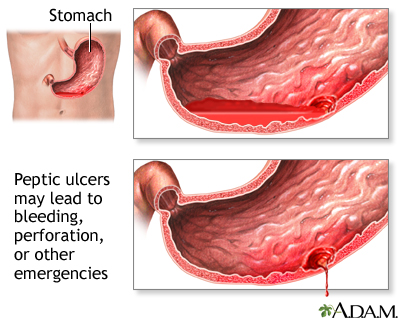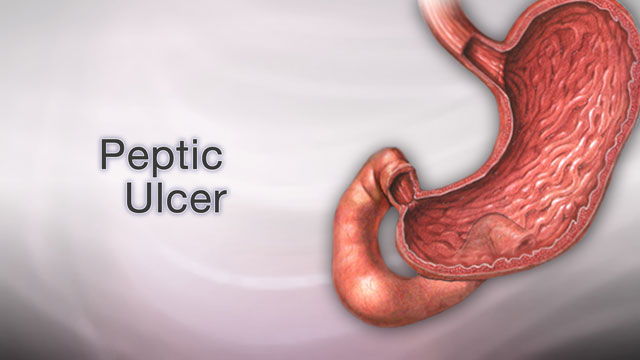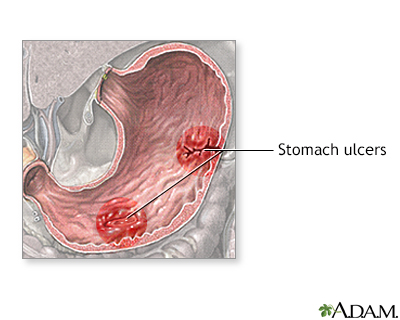Peptic ulcer
A peptic ulcer is an open sore or raw area in the lining of the stomach or intestine.
Peptic ulcer - Animation
If you've got stomach pain and nausea, any number of gastrointestinal problems could be to blame. When these symptoms don't go away, one possibility is that you have a peptic ulcer. Let's talk about peptic ulcers. A peptic ulcer is a defect in the lining of your stomach or the first part of your small intestine, the duodenum. When the defect is in your stomach, it's called a gastric ulcer. A defect in your duodenum is called a duodenal ulcer. Your stomach is filled with strong acid, which breaks down and digests the foods you eat. If you've ever seen a strong acid at work, you know that it starts to burn away anything it touches. That's why your stomach and intestines are equipped with a special lining to protect them. But if that lining breaks down for any reason, acids can start eating their way through. When acids burn a hole all the way through the stomach or duodenum, it's called a perforation, and that's a medical emergency. You may joke that your boss is giving you an ulcer, and it's possible that stress does play some part in ulcers. More likely, your ulcer is caused by a stomach infection with a type of bacteria called H. pylori. Other common ulcer risks include smoking cigarettes, drinking a lot of alcohol, or regularly using NSAID pain relievers like aspirin and ibuprofen. If the ulcer is small, you may have no idea that you have it because there are no symptoms. Larger ulcers can cause abdominal pain, a feeling of fullness in the stomach, and nausea. If you have any of these ongoing symptoms, your doctor will look inside your GI tract to see what's going on. One way to do this is with an upper endoscopy, a thin tube with a camera on one end that takes pictures as it moves through your stomach and small intestine. An upper GI is a series of x-rays that are taken after you drink a substance called barium. Your doctor will also test you for the H. pylori bacteria that may be causing your ulcer. Treatment for peptic ulcers works in two ways. If you have an H. pylori infection, you'll have a medication regimen to kill the bacteria. You'll also get a medicine called a proton pump inhibitor, such as Prilosec or Prevacid, which reduces the amount of acid in your stomach. Try to avoid taking NSAID pain relievers for long periods of time, especially if you have a problem with H. pylori. Use Tylenol instead. If you do have to take NSAIDs, also take an acid-blocking drug to protect your sensitive stomach. Also avoid tobacco smoke and excess alcohol. Follow your doctor's instructions carefully for treating a peptic ulcer. If you don't follow your treatment as directed, your ulcer could easily come back. Call your doctor right away if you have sharp stomach pain, if you're sweating a lot or feeling confused, or your stomach feels hard to the touch. These could be signs of a serious ulcer complication that needs immediate medical help.
There are two types of peptic ulcers:
- Gastric ulcer -- occurs in the stomach
- Duodenal ulcer -- occurs in the first part of the small intestine

Location of peptic ulcers
A peptic ulcer is an open sore or raw area in the lining of the stomach (gastric) or the upper part of the small intestine (duodenal).
Causes
Normally, the lining of the stomach and small intestines can protect itself against strong stomach acids. But if the lining breaks down, the result may be:
- Swollen and inflamed tissue (gastritis)
Gastritis
Gastritis occurs when the lining of the stomach becomes inflamed or swollen. Gastritis may last for only a short time (acute gastritis) or it may lin...
 ImageRead Article Now Book Mark Article
ImageRead Article Now Book Mark Article - An ulcer
Stomach ulcer - Animation
The stomach is the organ of the digestive system in which food travels from the esophagus and is further broken down before its nutrients are absorbed in the small intestine. It produces acid and various enzymes that break down food into simple substances. The inside wall of the stomach is protected from the acid and enzymes by a mucous lining. Ulcers are caused when there is an imbalance between the digestive juices produced by the stomach and the various factors that protect the lining of the stomach. Symptoms of ulcers may include bleeding. On rare occasions, an ulcer may completely erode the stomach wall. A major cause of stomach ulcers is the bacteria called Helicobacter pylori. Treatment regimens for ulcers caused this bacterium usually include medications to suppress the stomach acid as well as antibiotics to eradicate the infection.
Most ulcers occur in the first, inner surface, layer of the inner lining. A hole in the stomach or duodenum is called a perforation. This is a medical emergency.
Perforation
A perforation is a hole that develops through the wall of a body organ. This problem may occur in the esophagus, stomach, small intestine, large int...


Ulcer emergencies
Peptic ulcers may lead to emergency situations. Severe abdominal pain with or without evidence of bleeding may indicate a perforation of the ulcer through the stomach or duodenum. Vomiting of a substance that resembles coffee grounds, or the presence of black tarry stools, may indicate serious bleeding.
The most common cause of ulcers is infection of the stomach by bacteria called Helicobacter pylori (H pylori). Most people with peptic ulcers have these bacteria living in their digestive tract. Yet, many people who have these bacteria in their stomach do not develop an ulcer.
The following factors raise your risk for peptic ulcers:
- Drinking too much alcohol
- Regular use of aspirin, ibuprofen, naproxen, or other nonsteroidal anti-inflammatory drugs (NSAIDs)
- Smoking cigarettes or chewing tobacco
- Being very ill, such as being on a breathing machine
- Radiation treatments
- Stress
A rare condition, called Zollinger-Ellison syndrome, causes the stomach to produce too much acid, leading to stomach and duodenal ulcers.
Zollinger-Ellison syndrome
Zollinger-Ellison syndrome is a condition in which the body produces too much of the hormone gastrin. Most of the time, a small tumor (gastrinoma) i...


Cause of peptic ulcers
A major cause of peptic ulcer, although far less common than H.pylori or NSAIDS, is Zollinger-Ellison syndrome. A large amount of excess acid is produced in response to the overproduction of the hormone gastrin, which in turn is caused by tumors on the pancreas or duodenum. These tumors are usually malignant, must be removed and acid production suppressed to relieve the recurrence of the ulcers.
Symptoms
Small ulcers may not cause any symptoms and may heal without treatment. Some ulcers can cause serious bleeding.
Abdominal pain (often in the upper mid-abdomen) is a common symptom. The pain can differ from person to person. Some people have no pain.
Abdominal pain
Abdominal pain is pain that you feel anywhere between your chest and groin. This is often referred to as the stomach region or belly.

Pain occurs:
- In the upper abdomen
- At night and wakes you up
- When you feel an empty stomach, often 1 to 3 hours after a meal
Other symptoms include:
- Feeling of fullness and problems drinking as much fluid as usual
- Nausea
- Vomiting
- Bloody or dark, tarry stools
Bloody or dark, tarry stools
Black or tarry stools with a foul smell are a sign of a problem in the upper digestive tract. It most often indicates that there is bleeding in the ...
 ImageRead Article Now Book Mark Article
ImageRead Article Now Book Mark Article - Chest pain
Chest pain
Chest pain is discomfort or pain that you feel anywhere along the front of your body between your neck and upper abdomen.
 ImageRead Article Now Book Mark Article
ImageRead Article Now Book Mark Article - Fatigue
Fatigue
Fatigue is a feeling of weariness, tiredness, or lack of energy.
 ImageRead Article Now Book Mark Article
ImageRead Article Now Book Mark Article - Vomiting, possibly bloody
- Weight loss
Weight loss
Unexplained weight loss is a decrease in body weight, when you did not try to lose the weight on your own. Many people gain and lose weight. Uninten...
Read Article Now Book Mark Article - Ongoing heartburn
Exams and Tests
To detect an ulcer, you may need a test called an upper endoscopy (esophagogastroduodenoscopy or EGD).
- This is a test to check the lining of the esophagus (food pipe), stomach, and first part of the small intestine.
- It is done with a small camera (flexible endoscope) that is inserted down the throat.
- This test most often requires sedation given through a vein.
- In some cases, a smaller endoscope may be used that is passed into the stomach through the nose. This does not require sedation.

Gastroscopy procedure
The procedure called gastroscopy involves the placing of an endoscope (a small flexible tube with a camera and light) into the stomach and duodenum to search for abnormalities. Tissue samples may be obtained to check for H pylori bacteria, a cause of many peptic ulcers. An actively bleeding ulcer may also be cauterized (blood vessels are sealed with a burning tool) during a gastroscopy procedure.
EGD is done on most people when peptic ulcers are suspected or when you have:
- Low blood count (anemia)
- Trouble swallowing
- Bloody vomit
- Bloody or dark and tarry-looking stools
- Lost weight without trying
- Other findings that raise a concern for cancer in the stomach
Cancer in the stomach
Stomach cancer is cancer that starts in the stomach.
 ImageRead Article Now Book Mark Article
ImageRead Article Now Book Mark Article
Testing for H pylori is also needed. This may be done by biopsy of the stomach during endoscopy, with a stool test, or by a urea breath test.
H pylori
Helicobacter pylori (H pylori) is the bacteria (germ) responsible for most stomach (gastric) and duodenal ulcers and many cases of stomach inflammati...

Other tests you may have include:
- Hemoglobin blood test to check for anemia
Hemoglobin
Hemoglobin is a protein in red blood cells that carries oxygen. The hemoglobin test measures how much hemoglobin is in your blood.
 ImageRead Article Now Book Mark Article
ImageRead Article Now Book Mark ArticleAnemia
Anemia is a condition in which the body does not have enough healthy red blood cells. Red blood cells provide oxygen to body tissues. Different type...
 ImageRead Article Now Book Mark Article
ImageRead Article Now Book Mark Article - Stool occult blood test to test for blood in your stool
Stool occult blood test
The stool guaiac test looks for hidden (occult) blood in a stool sample. It can find blood even if you cannot see it yourself. It is a common type ...
 ImageRead Article Now Book Mark Article
ImageRead Article Now Book Mark Article
Sometimes, you may need a test called an upper GI series. A series of x-rays are taken after you drink a thick substance that contains barium. This does not require sedation.
Upper GI
An upper GI and small bowel series is a set of x-rays taken to examine the esophagus, stomach, and small intestine. Barium enema is a different test ...

Treatment
Your health care provider will recommend medicines to heal your ulcer and prevent a relapse. The medicines will:
- Kill the H pylori bacteria, if present.
- Reduce acid levels in the stomach. These include H2 blockers such as ranitidine (Zantac), or a proton pump inhibitor (PPI) such as omeprazole (Prilosec), lansoprazole (Prevacid), esomeprazole (Nexium), rabeprazole (AcipHex) or pantoprazole (Protonix).
Take all of your medicines as you have been told. Other changes in your lifestyle can also help.
Changes in your lifestyle
A peptic ulcer is an open sore or raw area in the lining of the stomach (gastric ulcer) or upper part of the small intestine (duodenal ulcer). This ...
Read Article Now Book Mark ArticleStomach ulcer - Animation
A stomach ulcer is caused by an imbalance between acid and pepsin secretion and the defenses of the stomach mucosal lining. Ulcers can be treated through dietary changes and medication.
If you have a peptic ulcer with an H pylori infection, the standard treatment uses different combinations of the following medicines for 7 to 14 days:
- Two different antibiotics to kill H pylori.
- PPIs such as omeprazole (Prilosec), lansoprazole (Prevacid), or esomeprazole (Nexium).
- Bismuth subsalicylate (the main ingredient in Pepto-Bismol) may be added to help kill the bacteria.
You will likely need to take a PPI for 8 weeks if:
- You have an ulcer without an H pylori infection.
- Your ulcer is caused by taking aspirin or NSAIDs.
Your provider may also prescribe this type of medicine regularly if you continue taking aspirin or NSAIDs for other health conditions.
Other medicines used for ulcers are:
- Misoprostol, a medicine that may help prevent ulcers in people who take NSAIDs on a regular basis
- Medicines that protect the tissue lining, such as sucralfate
If a peptic ulcer bleeds a lot, an EGD may be needed to stop the bleeding. Methods used to stop the bleeding include:
- Injecting medicine in the ulcer
- Applying metal clips or heat therapy to the ulcer
Surgery may be needed if:
- Bleeding cannot be stopped with an EGD
- The ulcer has caused a tear in the stomach or duodenum
Outlook (Prognosis)
Peptic ulcers tend to come back if untreated. There is a good chance that the H pylori infection will be cured if you take your medicines and follow your provider's advice. You will be much less likely to get another ulcer.
Possible Complications
Complications may include:
- Severe blood loss
- Scarring from an ulcer that may make it harder for the stomach to empty
- Perforation or hole of the stomach and intestines
When to Contact a Medical Professional
Get medical help right away if you:
- Develop sudden, sharp abdominal pain
- Have a rigid, hard abdomen that is tender to touch
- Have symptoms of shock, such as fainting, excessive sweating, or confusion
Shock
Shock is a life-threatening condition that occurs when the body is not getting enough blood flow. Lack of blood flow means the cells and organs do n...
 ImageRead Article Now Book Mark Article
ImageRead Article Now Book Mark Article - Vomit blood or have blood in your stool (especially if it is maroon or dark, tarry black)
Contact your provider if:
- You feel dizzy or lightheaded.
- You have ulcer symptoms.
Prevention
Avoid aspirin, ibuprofen, naproxen, and other NSAIDs. Try acetaminophen instead. If you must take such medicines, talk to your provider first. Your provider may:
- Test you for H pylori before you take these medicines
- Ask you to take PPIs or an H2 acid blocker
- Prescribe a medicine called misoprostol
The following lifestyle changes may help prevent peptic ulcers:
- DO NOT smoke or chew tobacco.
- Avoid alcohol.
Reviewed By
Michael M. Phillips, MD, Emeritus Professor of Medicine, The George Washington University School of Medicine, Washington, DC. Also reviewed by David C. Dugdale, MD, Medical Director, Brenda Conaway, Editorial Director, and the A.D.A.M. Editorial team.
Chan FKL, Lau JYW. Peptic ulcer disease. In: Feldman M, Friedman LS, Brandt LJ, eds. Sleisenger and Fordtran's Gastrointestinal and Liver Disease. 11th ed. Philadelphia, PA: Elsevier; 2021:chap 53.
Cover TL, Blaser MJ. Helicobacter pylori and other gastric Helicobacter species. In: Bennett JE, Dolin R, Blaser MJ, eds. Mandell, Douglas, and Bennett's Principles and Practice of Infectious Diseases. 9th ed. Philadelphia, PA: Elsevier; 2020:chap 217.
Lanas A, Chan FKL. Peptic ulcer disease. Lancet. 2017;390(10094):613-624. PMID: 28242110 pubmed.ncbi.nlm.nih.gov/28242110/.




 All rights reserved.
All rights reserved.